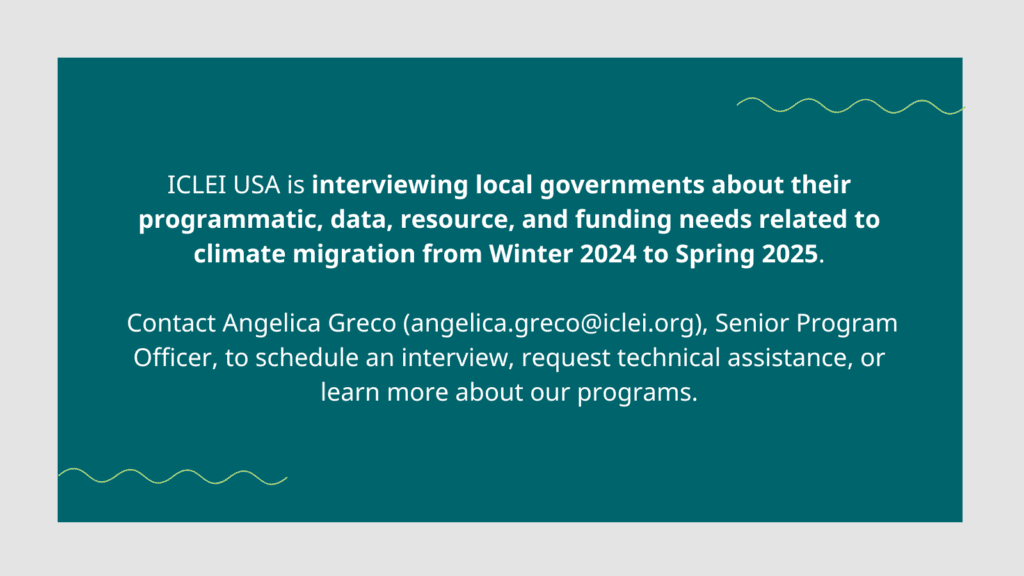Climate mobility, the phenomenon in which people are forced to move as a result of climate change and climate disasters, is a growing issue in the U.S. and around the world. Communities are increasingly feeling the effects of rising sea levels, extreme weather, and other climate-related disruptions, and these forces are pushing an increasing number of their residents to move. In 2023 a record-breaking 2.5 million people in the United States [1] were displaced by 28 separate billion-dollar climate events, and across the globe, a record-high 26.4 million people were climate displaced [2]. Within the United States, tens of millions of residents are predicted to become internally displaced, with the number forced to move due to sea level rise alone estimated to top 13 million [3].
This emerging, though still underappreciated, issue presents an array of challenges for local governments. Barriers, including limited data, resource constraints, and few successful best practice models, stand in the way of readiness. The topic was raised frequently at this year’s UN Climate Conference (COP). At ICLEI USA, our local government members are increasingly seeking solutions for how to plan and respond to this challenge.
ICLEI USA’s Vision and Plans
At ICLEI USA, we envision a future where communities across the country are prepared for climate-related mobility, with the resources, infrastructure, and support systems in place to manage this transition equitably. To achieve this, we are working with our network and global partners to understand what local governments need, and to develop scalable, funding-ready best practice models.

To kickstart this work, we are honored to host David Lubell as a Senior Climate Mobility and Cities Fellow, supported by Unbound Philanthropy. Lubell brings over twenty years of experience supporting communities experiencing rapid population growth due to in-migration, most recently as the founder and Executive Director of Welcoming America, the premiere organization in the U.S. focused on this topic. As an ICLEI-USA Climate Mobility and Cities Fellow, Lubell will support ICLEI member cities and counties interested in preparing intentionally for the arrival of “climate migrants,” particularly those displaced by climate-induced disasters. He will also support ICLEI cities most vulnerable to climate disasters to plan in advance for an equitable.

Additionally, ICLEI USA is partnering with GMF Cities on a project to help cities in Europe and North America prepare for climate-related mobility and displacement through peer learning workshops. The project will provide US and European cities with a forum for shared learning and problem-solving around climate mobility challenges. Ultimately, the workshops aim to create a shared understanding of climate mobility and develop policy recommendations that can be adapted for cities across both continents.
Best Practices: Cities Leading the Way
Two ICLEI USA member local governments, Cincinnati, Ohio, and Orlando, Florida, are emerging as leaders in climate mobility planning. Cincinnati’s Green Cincinnati Plan specifically addresses climate mobility. The plan outlines both short-term and long-term strategies to improve preparedness, including upgrading infrastructure, expanding affordable housing, and developing a climate migration response plan. A key tool in achieving these goals is the city’s Affordable Housing Trust Fund, which provides developers with subsidies to create housing options for low- to middle-income residents, supporting both current residents and potential new arrivals.
Orlando, already a receiving city for migrants displaced by natural disasters, notably after Hurricane Maria, is also preparing for a possible influx of climate migrants. Even as coastal areas in Florida face rising sea levels and more intense storms, Orlando expects as many as 500,000 new residents by the end of the century. The city’s Climate Action Plan includes strategies to create permanent supportive housing for climate refugees, veterans, and homeless individuals. Orlando is also focusing on improving public transportation and expanding its infrastructure to sustainably accommodate a growing population.

Building an Equitable Future
As climate migration becomes an increasingly urgent issue, ICLEI USA is committed to ensuring that local governments are equipped to respond. We aim to empower cities to create inclusive, resilient communities that support both current residents and those affected by climate change. By learning from innovative cities like Cincinnati and Orlando, and continuing to develop forward-thinking programs that are responsive to local government needs and realities, we can help local governments lead the way in addressing one of the most pressing challenges of our time.
Are you a local government staff member interested in climate migration? Contact Angelica at angelica.greco@iclei.org to request technical assistance, learn more about our opportunities, or schedule an interview with our Climate Migration and Cities Fellow, David Lubell (david.lubell@iclei.org).
[1] Wachtendorf, T., & Kendra, J. (n.d.). Extreme weather in U.S. displaced 2.5 million people last year. Scientific American.
[2] Internal Displacement Monitoring Centre (2024). Global report on internal displacement (GRID 2024).
[3] Hauer, M. Migration induced by sea-level rise could reshape the US population landscape. Nature Clim Change 7, 321–325 (2017).